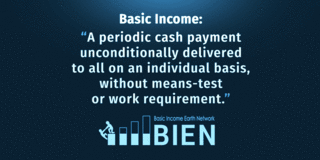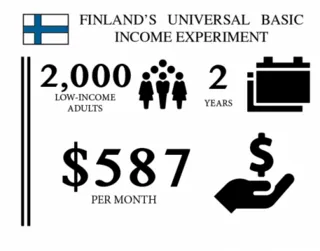If you are unfamiliar with this concept, Universal Basic Income (UBI) is a relatively new economic idea that advocates paying every adult (perhaps everyone, from cradle to grave) within a country a basic income from state coffers.

The idea has been developed, giving rise to different variations, but they all seem to agree on the following criteria:
· It is paid periodically (typically every month)
· It is a cash payment (ie it can be spent on whatever the recipient decides)
· It is paid to an individual (ie not a household)
· It is paid to everyone without means testing
· It is paid with no strings attached (ie the recipient is under no pressure to work or seek work)
The idea is that if the UBI is set at the poverty line – around $1000 a month in the USA, for example – then poverty will eventually be all but eliminated.
It’s a fascinating idea, and as automation has an increasingly detrimental affect on jobs, it could be a necessity in the coming years. It is certainly a progressive concept and hugely ambitious. It is supported by people such as Mark Zuckerberg, Elon Musk, Stephen Hawkins and Bernie Sanders, but reeks of socialism – perhaps even communism – and as such is viewed with much scepticism by many of those on the right.
At the moment, Finland is attempting a pilot study to try and gauge the effects of the scheme, but oddly, the Finnish government is centre-right and austerity focussed. It appears that they want to find out if UBI will ultimately incentivise people to take up paid work. That sounds intuitively nonsensical, but the thinking is that some people avoid work because they feel that they may be worse off than being on welfare, or fear the difficulty of getting back on welfare if the work fails. If these worries are removed, are people more likely to work?

Another advantage of UBI is that it could, in effect, remove welfare systems, which are hugely bureaucratic and expensive to run. A simple, streamlined system of universal payments would cost a fraction to administer.
Quite how UBI would be funded is a source of some controversy. Clearly, it would be hugely expensive, and this would have to be funded somehow, and it seems that the simplest way to do this would be to make the super-rich foot the bill. This, of course, is going to upset much of the right. The gap between rich and poor is increasing, and it is happening at a time where we can all see it occurring. It is happening in plain sight, shamelessly, and it is difficult to see a scenario where Western governments will redistribute wealth in this manner.
Something to consider in all this is that it seems likely that the vast majority of this UBI will be spent by the recipients of it. Imagine an economy where everyone gets (for example) $12000 more spending power, every year. This is bound to have an extremely positive knock-on effect, isn’t it?
The layers to this idea are many. Will it make for a happier planet? Will people spend less time in jobs that they hate? Will they be less stressed and by definition, happier? Will it make people more materialistic, or less? If all basic economic necessities are covered, will people re-evaluate what is important in their lives? Or will UBI make people lazy and complacent?
What do you think?
Further reading:
http://basicincome.org/basic-income/
https://www.ft.com/content/3b7938e6-c569-11e7-b30e-a7c1c7c13aab
https://www.forbes.com/sites/adigaskell/2018/03/05/does-a-universal-basic-income-discourage-work/
Good viewing here.
